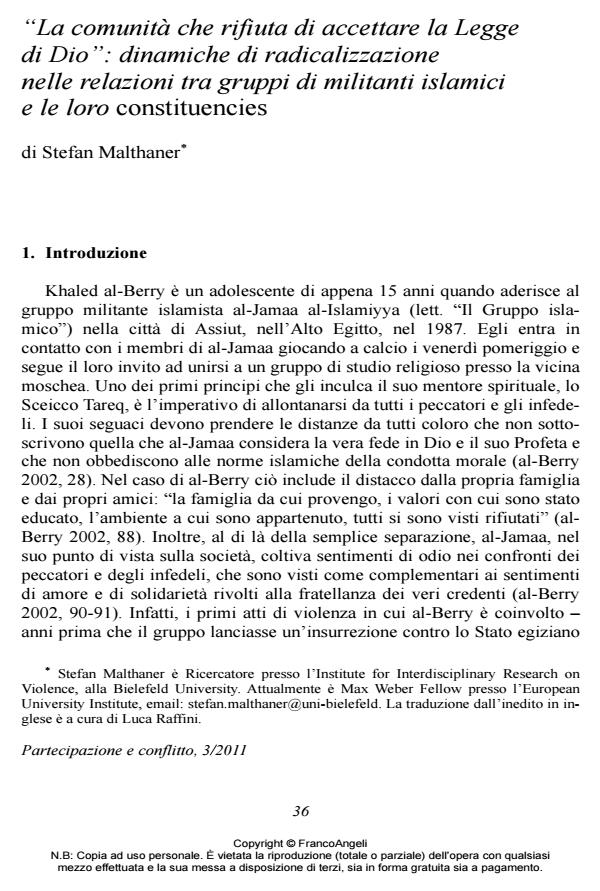"La comunità che rifiuta di accettare la Legge di Dio": dinamiche di radicalizzazione nelle relazioni tra gruppi di militanti islamici e le loro constituencies
Titolo Rivista PARTECIPAZIONE E CONFLITTO
Autori/Curatori Stefan Malthaner
Anno di pubblicazione 2011 Fascicolo 2011/3
Lingua Italiano Numero pagine 22 P. 36-57 Dimensione file 392 KB
DOI 10.3280/PACO2011-003003
Il DOI è il codice a barre della proprietà intellettuale: per saperne di più
clicca qui
Qui sotto puoi vedere in anteprima la prima pagina di questo articolo.
Se questo articolo ti interessa, lo puoi acquistare (e scaricare in formato pdf) seguendo le facili indicazioni per acquistare il download credit. Acquista Download Credits per scaricare questo Articolo in formato PDF

FrancoAngeli è membro della Publishers International Linking Association, Inc (PILA)associazione indipendente e non profit per facilitare (attraverso i servizi tecnologici implementati da CrossRef.org) l’accesso degli studiosi ai contenuti digitali nelle pubblicazioni professionali e scientifiche
In the study of radicalization and processes of political violence, the relationship between militant groups and their social and political environment is considered mainly with respect to interactions between the militants and their adversaries (police, governments). Drawing on an analysis of the Egyptian militant Islamist group al-Jamaa al-Islamiyya between 1986 and 1997, this paper argues that beyond this dyadic relationship, interactions between the militants and their constituencies [social environment] may contribute to processes of radicalization. In the case of al-Jamaa al-Islamiyya, two basic mechanisms could be identified that reinforced this process: Firstly, the militants’ agenda of transforming the Muslim community’s social and cultural order (fighting moral corruption in society) caused resentment and triggered a cycle of rejection and radicalization, culminating in attempts to impose norms of moral conduct by force, which, in turn, contributed to a further loss of support. Secondly, the weakening of support during the violent conflict with the police triggered a dynamic of social isolation and radicalization, either in a pattern of withdrawal and disengagement, with militants turning away from local arenas and engage in national (or international) terrorist campaigns; or in a violent struggle over controlling the community, in which the militants reacted to what they perceived as betrayal by trying to coerce and terrorize the population into compliance and into not collaborating with their enemy, thereby destroying all remnants of supportive relations with local communities.
Parole chiave:Radicalization, Islamist movements, Egypt, political violence, interaction
Stefan Malthaner, "La comunità che rifiuta di accettare la Legge di Dio": dinamiche di radicalizzazione nelle relazioni tra gruppi di militanti islamici e le loro <i>constituencies</i> in "PARTECIPAZIONE E CONFLITTO" 3/2011, pp 36-57, DOI: 10.3280/PACO2011-003003